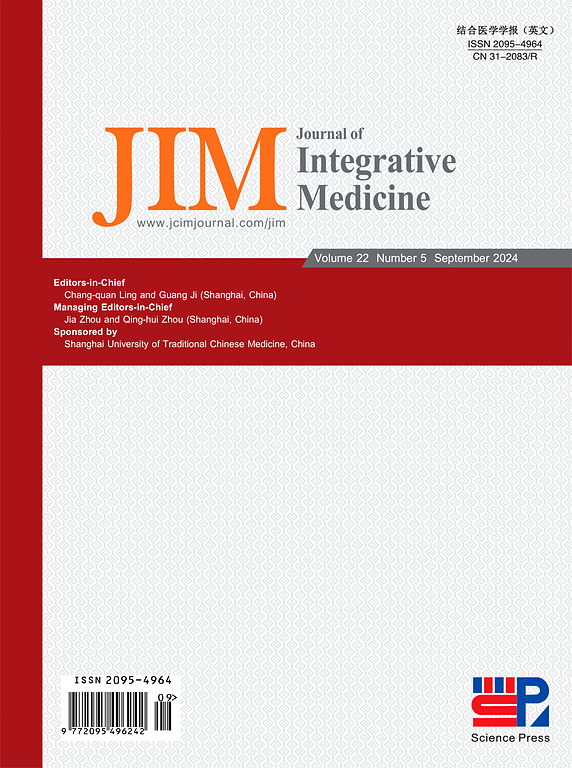Advancements and challenges of acupuncture randomized controlled trials
IF 4
2区 医学
Q1 INTEGRATIVE & COMPLEMENTARY MEDICINE
引用次数: 0
Abstract
Acupuncture is an ancient treatment method used in traditional Chinese medicine and has been popularized worldwide. Over the past decade, there has been an increase in the amount of acupuncture research, mostly comprised of randomized controlled trials (RCTs) that aimed to answer the question on the efficacy of acupuncture. However, poor methodology and low replicability in these acupuncture RCTs have resulted in uncertainty about the efficacy of acupuncture. In this review, current advancements and challenges in acupuncture RCTs, regarding the methodological aspects of randomization, blinding, sham acupuncture and quality of reporting, were discussed. While there have been advancements in various aspects, current acupuncture RCTs still face pressing issues such as inadequate randomization and blinding, unviable sham acupuncture controls, and poor reporting quality. Given these limitations, this review seeks to identify the methodological problems that are responsible for these problems and to suggest solutions that could help to overcome them so as to improve the quality of future studies evaluating the efficacy of acupuncture.
Please cite this article as: Seetoh WS, Lim RQR, Xu RB, Sun MX, Zhang P, Wang MN. Advancements and challenges of acupuncture randomized controlled trials. J Integr Med. 2025; 23(4): 333–343.
针灸随机对照试验的进展与挑战。
针灸是一种古老的中医治疗方法,在世界范围内得到推广。在过去的十年里,针灸研究的数量有所增加,主要是由随机对照试验(rct)组成,旨在回答针灸疗效的问题。然而,在这些针灸随机对照试验中,较差的方法学和较低的可重复性导致了针灸疗效的不确定性。本文综述了针刺随机对照试验在方法学方面的进展和挑战,包括随机化、盲法、假针灸和报告质量。虽然在各个方面都取得了进步,但目前的针灸随机对照试验仍然面临着随机化和盲化不足、假针灸对照不可行、报告质量差等紧迫问题。鉴于这些局限性,本综述旨在找出导致这些问题的方法学问题,并提出有助于克服这些问题的解决方案,以提高评估针灸疗效的未来研究的质量。本文署名:Seetoh WS, Lim RQR, Xu RB, Sun MX, Zhang P, Wang MN。针灸随机对照试验的进展与挑战。集成医学[J];打印前Epub。
本文章由计算机程序翻译,如有差异,请以英文原文为准。
求助全文
约1分钟内获得全文
求助全文
来源期刊

Journal of Integrative Medicine-Jim
Medicine-Complementary and Alternative Medicine
CiteScore
9.20
自引率
4.20%
发文量
3319
期刊介绍:
The predecessor of JIM is the Journal of Chinese Integrative Medicine (Zhong Xi Yi Jie He Xue Bao). With this new, English-language publication, we are committed to make JIM an international platform for publishing high-quality papers on complementary and alternative medicine (CAM) and an open forum in which the different professions and international scholarly communities can exchange views, share research and their clinical experience, discuss CAM education, and confer about issues and problems in our various disciplines and in CAM as a whole in order to promote integrative medicine.
JIM is indexed/abstracted in: MEDLINE/PubMed, ScienceDirect, Emerging Sources Citation Index (ESCI), Scopus, Embase, Chemical Abstracts (CA), CAB Abstracts, EBSCO, WPRIM, JST China, Chinese Science Citation Database (CSCD), and China National Knowledge Infrastructure (CNKI).
JIM Editorial Office uses ThomsonReuters ScholarOne Manuscripts as submitting and review system (submission link: http://mc03.manuscriptcentral.com/jcim-en).
JIM is published bimonthly. Manuscripts submitted to JIM should be written in English. Article types include but are not limited to randomized controlled and pragmatic trials, translational and patient-centered effectiveness outcome studies, case series and reports, clinical trial protocols, preclinical and basic science studies, systematic reviews and meta-analyses, papers on methodology and CAM history or education, conference proceedings, editorials, commentaries, short communications, book reviews, and letters to the editor.
Our purpose is to publish a prestigious international journal for studies in integrative medicine. To achieve this aim, we seek to publish high-quality papers on any aspects of integrative medicine, such as acupuncture and traditional Chinese medicine, Ayurveda medicine, herbal medicine, homeopathy, nutrition, chiropractic, mind-body medicine, taichi, qigong, meditation, and any other modalities of CAM; our commitment to international scope ensures that research and progress from all regions of the world are widely covered. These ensure that articles published in JIM have the maximum exposure to the international scholarly community.
JIM can help its authors let their papers reach the widest possible range of readers, and let all those who share an interest in their research field be concerned with their study.
 求助内容:
求助内容: 应助结果提醒方式:
应助结果提醒方式:


